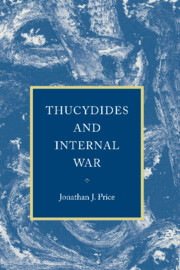5 - The “greatest kinesis”
Published online by Cambridge University Press: 22 September 2009
Summary
Thucydides opens his History with a series of astonishing superlatives. He says (1.1.1) that he started writing with the expectation that the war would be “the most worthy to be told” of all wars up to that time (ἀξιολογώτατον τῶν προγεγενημένων). By the end of the war this initial impression, if that is what it was, proved more correct than he could have known, “for [the war] was the greatest kinesis to befall the Hellenes and a considerable portion of the non-Hellenes, so to speak most of mankind” (1.1.2). These superlatives may seem less remarkable now because we are used to Thucydides, but he himself expected incredulity, or at least skepticism, and proceeded immediately to support his claim by reviewing all Hellenic history to his day – the “Archaeology.” At the end of that section, Thucydides repeats his assertion that the war was “greater” (μείζων) than all others by his own self-consciously objective standard, “for men are wont to consider the war they are currently fighting as the greatest, but when it is over go back to being impressed by events in antiquity” (1.21.2). He illuminates what makes the present war “great” and “worthy to be told”:
Of previous actions the greatest was the Persian war, but this reached a quick decision with two battles at sea and two on land. The present war extended over a very long period, and in its course sufferings befell Hellas such as had never occurred in an equal amount of time. […]
- Type
- Chapter
- Information
- Thucydides and Internal War , pp. 207 - 273Publisher: Cambridge University PressPrint publication year: 2001



